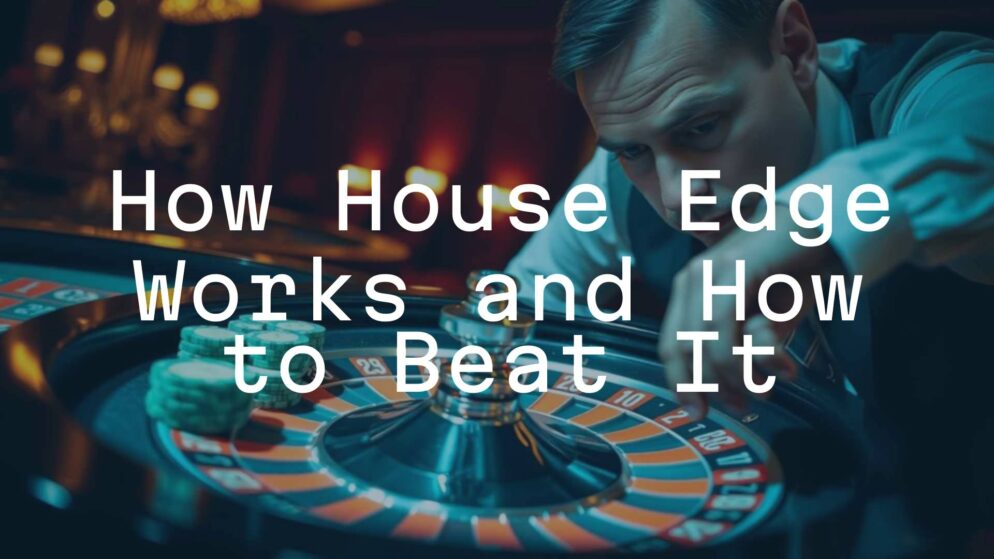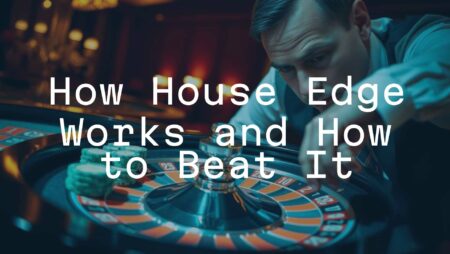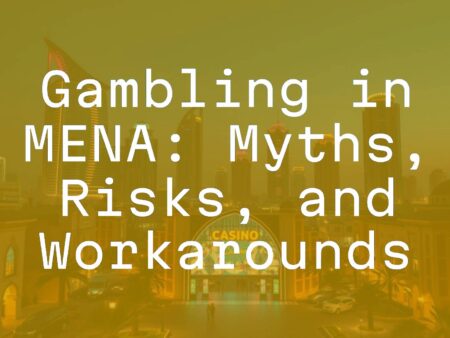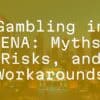

Have you ever noticed that casinos almost always come out ahead? This is thanks to something called the “house edge.” The house edge is simply the built-in advantage that casinos have over players in every game. It’s not about cheating; casino games are made so that, over time, the casino earns a steady profit. Sure, players can win in the short term, but the house edge means that if you play long enough, you’re likely to lose at a level close to this average. Understanding the house edge is an important part of making smarter choices at the casino and possibly even increasing your chances of winning.
This article explains how the house edge works, how it’s figured out, how it affects your money, and how its size can change depending on which game you choose. We’ll also go over some strategies for keeping the house edge low so you have a better shot at leaving with winnings.

What Is House Edge in Casino Games?
The house edge (sometimes called the casino advantage) is the percentage of every bet that the casino expects to make over time. Every casino game-from roulette to slot machines-has this built-in advantage. There’s nothing sneaky about it; it’s just part of how casinos make money, pay staff, and run their business.
Here’s a simple example: If a game has a house edge of 5%, it means that for every $100 bet, the casino expects to keep $5 as profit and pay back $95 in winnings (on average). Remember, this is about a lot of games over a long period. You might win big or lose your money quickly in the short run, but in thousands or millions of rounds, the numbers work out as expected. This keeps casinos running smoothly and profitably.
House Edge, RTP, and Payout Percentage-What’s the Difference?
These terms are all related, but not exactly the same. Return to Player (RTP) and payout percentage both describe how much money a game gives back to players, on average. For example, a game with a 95% RTP returns $95 for every $100 bet, over a large number of plays.
The house edge is just the flip side of RTP. If a slot machine advertises a 95% RTP, its house edge is 5%. If you know one, you know the other. As a player, you want games with a higher RTP (and lower house edge) because it means getting back more of your money while you play.

Why the House Doesn’t Need to Cheat
The house edge isn’t about tricking players or secret traps. It’s just simple math. All casino games are set up in a way that slightly favors the casino. This small edge, even if hard to notice in each round, guarantees the casino earns money as players keep betting. For instance: in roulette, you get paid 35 to 1 if you hit a single number, but there are 37 or 38 slots that ball could land in-so your true odds are a bit worse. That little difference is how the casino keeps its edge.
Because the house edge is built into every game, casinos don’t need to worry about cheating. As long as enough people are playing, the house edge will keep bringing in profits-and allow casinos to keep the lights on and offer new games.
How Does House Edge Work?
House edge works quietly in the background every time you play. It’s not about who wins each hand or spin, but about how the math adds up for the casino over time. The more you play, the closer your results will be to that expected loss from the house edge.
You can think of the house edge as a small “cost” added to every bet. Even though you might win a round or two, in the long run, the house edge slowly pushes your results closer to a loss-known as “the grind.”
How Is House Edge Figured Out?
House edge calculations are based on the game’s rules and payouts. For games of luck, like roulette, it’s simply comparing the true odds of winning to the payout. For example, with American roulette, there are 38 pockets. If you bet $1 on a single number, you win $35 (plus your $1 back) if you hit. But the true odds say you should win $38 if payouts matched the odds. The casino keeps the difference: $2 for every $38 bet, which is about 5.26% house edge.
For games where skill matters, like blackjack or video poker, house edge is based on perfect strategy. If you don’t use the best strategy, the house edge gets bigger, because making mistakes helps the casino. So, how big the house edge is can depend on how well you play.
How House Edge Affects Your Money
The house edge decides, on average, how much money you will lose for every dollar you bet. If you’re playing a game with a high house edge, your money disappears faster over time. If you pick games where the edge is small, your money lasts longer.
Examples:
- Game with 10% house edge: Bet $1,000, expect to lose about $100 on average.
- Game with 1% house edge: Bet $1,000, expect to lose only about $10 on average.
This shows why choosing games with a low house edge is so important for anyone who wants to play longer or lose less money.

Why Players Should Know About House Edge
Knowing about house edge helps you find the best games and make better choices with your money. Some games let you make more decisions that matter, and the house edge can be lower. Other games, especially ones with big jackpots, may have higher house edges. Picking the right games gives you the best shot at winning, or at least not losing too much.
House Edge in Popular Casino Games
The house edge isn’t the same for every game. It can change a lot from one game to another, or even depending on which rules are used. Here are the house edge numbers for some common casino games:
Blackjack
Blackjack is popular because its house edge can be very low-sometimes less than 1%-if you play with the best strategy. This is because you get to make meaningful choices each hand, like hitting, standing, doubling down, or splitting.
The house edge depends on the exact rules of the table, too-like how many decks are used and if the dealer hits on soft 17. The better the rules are for players, and the better you play, the closer the house edge gets to its minimum.
| Blackjack Situation | House Edge |
|---|---|
| With basic strategy | 0.5% – 1% |
| Poor strategy | 2% – 3% or more |
| Single-deck, best rules | ~0.5% |
Card Counting
Some skilled players use card counting to try to gain an edge. This means tracking what cards have been played and raising their bets when the deck favors them. It’s not illegal, but casinos don’t like it and can ask counters to leave. Card counting takes a lot of practice and isn’t for most people.
Roulette
Roulette comes in different forms, and each has a different house edge:
| Roulette Type | House Edge |
|---|---|
| American (double zero) | 5.26% |
| European (single zero) | 2.70% |
| French (single zero, special rules) | 1.35% (even-money bets) |
French roulette gives the best odds, thanks to special rules like “La Partage” and “En Prison,” which help cut the edge on even-money bets in half. If you can, always pick French or European roulette over American roulette.
Baccarat
Baccarat is simple-pick whether the “Banker” or “Player” will win, or if it’s a tie. The house edge is low, making it a good choice for careful players.
| Bet | House Edge |
|---|---|
| Banker | 1.06% |
| Player | 1.24% |
| Tie | 14% – 15% |
Even with a 5% commission on Banker bets, it’s still the safest bet in baccarat. Tie bets might look good with high payouts, but the house edge is so large you’re likely to lose much more over time.
Craps
Craps offers many different bets, with very different house edges:
| Bet | House Edge |
|---|---|
| Pass/Don’t Pass | 1.36% – 1.41% |
| Odds bets (after Point) | 0% (true odds, no edge) |
| Proposition bets (Any Seven, Hardways, etc.) | 10% – 16% or more |
Smart craps players stick with Pass, Don’t Pass, Come, or Don’t Come bets, and always add odds bets when possible, since these have no house edge. Avoid most of the strange bets in the center of the table.
Slot Machines
Slots are the easiest games to play, but they usually have a higher house edge. Each slot is different; some give better returns than others.
| Type of Slots | House Edge |
|---|---|
| Online slots | 2% – 15% |
| Progressive jackpot slots | Often higher, RTP drops if not going for jackpot |
The house edge in slots is fixed by the machine’s programming and can usually be found as RTP in the game’s info. If you’re aiming for the progressive jackpot, be aware the edge goes up unless you’re betting max lines and coins. Playing fewer lines can also make the house edge worse.
Video Poker
Video poker gives players some of the best odds-if you follow the best strategy and pick machines with full-pay paytables. The house edge depends on two things: the paytable for that variant, and your skill in playing correctly.
| Game | House Edge |
|---|---|
| Jacks or Better (full pay, optimal strategy) | 0.46% – 0.75% |
| Other variations (Deuces Wild, etc.) | Varies; check paytables |
Study basic strategies before you play. The more you stick to the right choices, the better your odds.

Which Casino Games Have the Lowest and Highest House Edge?
If you want your money to last, or you want the best shot at walking away a winner, pick games with a low house edge.
Games With a Low House Edge
- Video Poker: Some versions (like good Jacks or Better) come in at 0.46%-0.75% with perfect play.
- Blackjack: Around 0.5%-1% with basic strategy.
- Baccarat (Banker bet): 1.06%-1.17% (Player bet is also low: 1.24%-1.36%).
- French Roulette (even-money bets): 1.35%
- Craps (with odds bets): Pass/Don’t Pass (~1.4%) plus odds bets (0%).
These games give you more control and ask you to make choices. The better informed your decisions, the lower the house edge becomes.
Games With a High House Edge
- Keno: Often 20%-40%. Your chances aren’t good here.
- Slot Machines: Usually 2%-15%, or higher for progressive jackpots.
- American Roulette: 5.26% (double zero).
- Three Card Poker: 3.4%-7.2%, depending on the rules.
- Caribbean Stud Poker: Usually 5% or more.
Easier games-ones that require little skill-are often more expensive to play in the long run.
House Edge in Online Casinos
Online casino games use the same house edge principles as land-based casinos. But there are a few extra things to watch for online.
Online vs. Land-Based House Edge
The main difference is usually in the details: online casinos have lower running costs, so their games sometimes have better rules or higher RTP numbers. For example, some online slots offer 97%-99% RTP, which is less common in brick-and-mortar casinos. But the basic odds for blackjack, roulette, and other table games usually match what you’d find in any real-world casino.
RTP and Paytable Transparency
Online casinos almost always show the RTP for their games, especially slots. This lets you choose the ones with the best returns before you play. For video poker, the paytable is always on the screen, so you can pick the best odds easily. This openness is a clear plus for online players who want to play smart and avoid games with poor odds.
Can You Beat the House Edge?
Many players wonder if it’s possible to beat the house edge. For most people, beating this built-in advantage over the long run is not realistic-the math always catches up eventually. Still, knowing about house edge does let you battle against it, keep losses down, and maybe cash out a winner in the short run.
Common Misconceptions
A lot of people think they can “break” the house edge by going on a lucky run or believing a win is sure to come after losses (called the gambler’s fallacy). Others think casinos cheat, but the house edge alone makes cheating unnecessary. Superstitions or lucky items don’t change the math either. Short-term wins are possible, but over enough time, the house edge is always there.
Strategy and Skill Games
There is some hope in games where your choices matter, like blackjack or video poker. Using the best strategies can lower the house edge to well under 1%. Learning and using solid strategy keeps you in the game longer and gives you the best possible odds.
The Gambler’s Fallacy Explained
The gambler’s fallacy is believing that if something happens more often than normal during a given period (e.g., red comes up five times in a row in roulette), then it will happen less often in the future-or vice versa. In truth, each spin, hand, or round is independent. Past results don’t change your future odds.
Falling for this leads to poor choices, like betting bigger to catch up or stopping early when you’re ahead. To play smarter, recognize that every round is a fresh start, no matter what happened before.
How to Lessen the House Edge and Boost Your Odds
You can’t get rid of the house edge entirely. But you can cut down its effect by doing the following:
Pick the Best Games
Choose games with the lowest house edge-like blackjack, video poker, baccarat Banker bets, and French/European roulette. Steer clear of games like keno and high-edge slot machines, unless you’re playing just for fun and not worried about losing.
Use Smart Strategy
For blackjack and video poker, it’s not enough to know the rules-you need to study and use the right strategies every time. Carry a strategy chart for blackjack or study paytables and optimal moves for video poker.
Manage Your Bankroll
Set a strict budget for your gambling, and never bet more than you can afford to lose. Break your bankroll into smaller amounts for each session. Don’t chase losses-walk away when it’s gone for the day.
Look for Bonuses and Promotions
Online casinos often offer bonuses and free spins. Use these to stretch your bankroll further-just read the terms so you know how much you need to play before cashing out. If you play at a physical casino, use your players club card to get comps like free meals or hotel rooms.
Set Limits on Time and Money
Decide ahead of time how much money and time you’ll spend gambling. Stick to it. Set win and loss limits: if you reach them, walk away for the day. Playing longer gives the house edge more time to work, so breaks and time limits help you enjoy the casino without losing all your funds.

Frequently Asked Questions About House Edge
Which casino games have the lowest house edge?
The best odds are usually in video poker (as low as 0.46% with the right game and strategy), blackjack (0.5%-1% with basic strategy), baccarat Banker bets (about 1.06%), and French roulette on even bets (1.35%).
Should you pick jackpots or lower house edge games?
If you’re after a huge jackpot, you might go for slots or progressive games, but these usually have a higher house edge, meaning you’ll lose more on average. If you want your money to last longer and to have the best chance of winning, stick with low house edge options.
How can players keep losses small?
- Pick games with the lowest house edge.
- Always use the best strategies in skill games.
- Set strict limits for yourself-don’t go beyond your planned budget or time.
- Take advantage of bonuses, comps, or promotions.
- Avoid falling for the gambler’s fallacy-stick to the facts about odds.
What other things should players think about?
Besides the house edge, check the RTP (for slots), learn about how often wins come (volatility), and look at paytables for video poker and other games. Volatility tells you whether a game pays small wins often (low volatility) or big wins rarely (high volatility). Also, understand the “hold percentage,” which is another way to describe what the casino expects to keep out of all bets.








